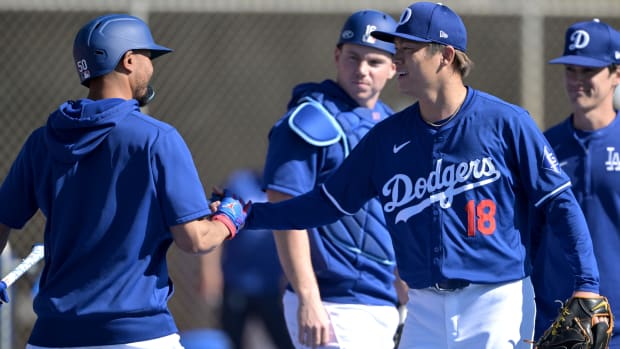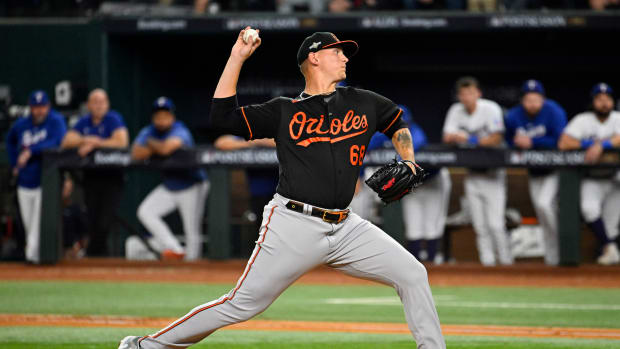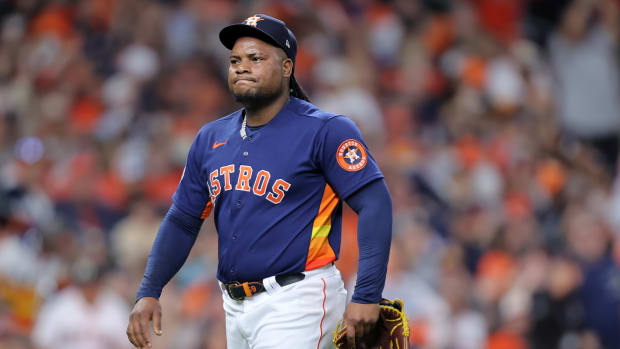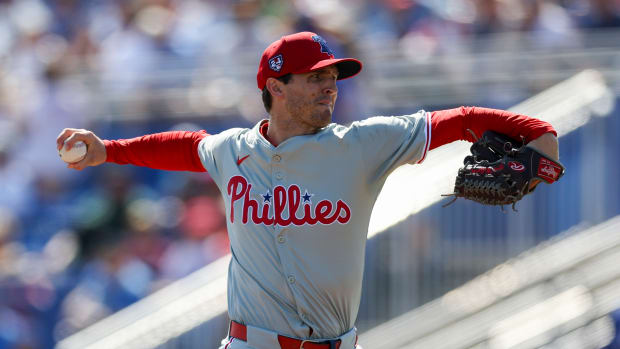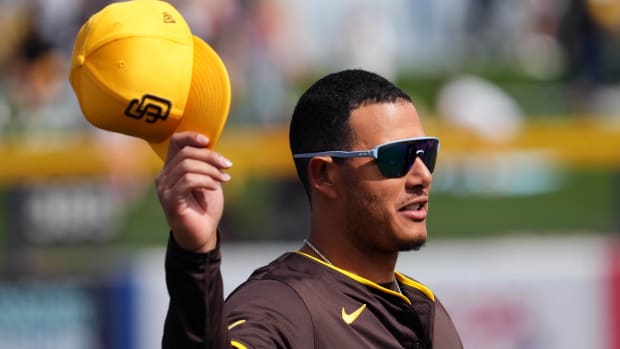
ALDS Game 3: Angels' quiet bats must wake up to stay alive vs. Royals
AL Division Series Game 3
Angels at Royals
Start Time: 7:37 p.m. ET
TV: TBS
Starting Pitchers: C.J. Wilson (13-10, 4.51 ERA) vs. James Shields (14-8, 3.21 ERA)
The Angels won more games than any other major league team this season, but they're now a single loss away from a long offseason thanks to the disappearance of their offense, which scored just three runs on 10 hits over 22 innings in the first two games of the series. Not only do they have to win, but they have to do so on the road behind the least effective of their rotation staples. Meanwhile, in their first postseason appearance since 1985, the Royals have won their first three games, all in extra innings, a major league record on that front.
Historically speaking, the odds aren't great for the Angels, to say the least. Cliff Corcoran did the number crunching for today’s Tigers-Orioles preview:
Prior to this year, 68 best-of-five series in postseason history began with one team taking a 2-0 lead. In 88 percent of those (60 of 68), the team leading after two games won the series. Sixty percent of those series (41 of 68) ended in sweeps. Of the 27 teams who managed to pull out a win in Game 3, 19 went on to lose in Game 4 or 5. Just eight of the 68 teams (12 percent) to fall behind 0-2 came back to win the series, most recently the Giants in the 2012 NLDS against the Reds.
A quick list of the other seven:
• 1981 Dodgers over Astros in NL Division Series (as created by the strike)
• 1982 Brewers over Angels in ALCS
• 1984 Padres over Cubs in NLCS
• 1995 Mariners over Yankees in ALDS
• 1999 Red Sox over Indians in ALDS
• 2001 Yankees over A's in ALDS
• 2003 Red Sox over A's in ALDS
There are a few small comforts for the Angels to take from recent history and this year. For one, five of the eight teams to come back from 2-0 had home field advantage for Game 5, as the Angels would. The Halos went 46-35 on the road, tied for the second-best record in the AL (the Royals were 47-34, the Mariners 46-35). Their +91 run differential and .613 Pythagorean winning percentage under the circumstances were tops in all of baseball. On the other side of the coin, the Royals went just 42-39 at home, the worst of the 10 teams to make the postseason and a middle-of-the-pack eighth-best in the AL overall; furthermore, they were outscored by 42 runs at Kauffman Stadium en route to a .440 Pythagorean winning percentage, the league's fourth-worst clip.
The road to a title — or not — for every Division Series team
Even taking all that into account, the numbers don't bode well for Los Angeles. Based on lineups and pitching matchups, the ZiPS projection system of ESPN's Dan Szymborski estimates the Angels' chances of taking the series at 12 percent — the same as the historical odds for teams down 2-0. That has plenty to do with the poor quality of C.J. Wilson's season, by far the worst of his five since shifting from the bullpen to the rotation. His 81 ERA+ and 0.0 WAR were the fourth-worst among all pitchers to make at least 30 starts in 2014, while his 48 percent quality start rate was the seventh-worst among all qualifiers.
Underlying that performance was a league-high walk rate (4.4 per nine) and total (85), though thanks to respectable home run and strikeout rates (0.7 and 7.7 per nine), Wilson’s 4.31 FIP was only seventh-worst among qualifiers. Worse news: he was terrible on the road (5.31 ERA, 4.95 FIP, 1.5 K/BB ratio) and in the second half after returning from a right ankle sprain, averaging just under five innings per start with a 4.85 ERA and a 1.2 strikeout-to-walk ratio. He does not have a great track record of postseason success, either, racking up a 4.82 ERA in nine starts and one relief appearance totaling 52 1/3 innings. He had three quality starts out of four in the 2010 postseason but went 0-for-5 the following year.
If there's a split that works in Wilson's favor, it's that he held lefties to a .201/.304/.268 line in 2014, compared to .277/.365/.409 against righties. But even then, two of the Royals' four starting lefties, Nori Aoki and Alex Gordon, handle southpaws well, while Eric Hosmer and Mike Moustakas do not. Hosmer and Moustakas own the Royals' only home runs in this series — huge, game-winning 11th-inning homers at that — but as a whole, the team has hit .162/.232/.270 thus far. Hosmer is the only player with more than two hits while Billy Butler (0-for-7) and Omar Infante (0-for-8) are wearing the horse collar.
So too are the Angels' Mike Trout (0-for-8) and Josh Hamilton (0-for-9) for a team that's been even worse at the plate (.141/.228/.239), but then it's not like they're that far behind their teammates. While Kole Calhoun is 4-for-10, the rest of the club is 6-for-61 combined, with no more than one hit apiece, and David Freese, who has a homer and a pair of walks, is the only other Angel to reach base safely more than twice.
That slumping bunch will go up against James Shields, who at the very least ought to be fresh after throwing just 88 pitches over five-plus innings in Tuesday night's Wild-Card Game. He owns a 5.26 ERA in seven postseason turns, just two of which have been quality starts, back in 2008. This isn't to say that the 2014 model hasn't been good: his 3.21 ERA across 227 innings with a 71 percent quality start rate were all strong. He was fourth in innings pitched, sixth in walk rate (1.6 per nine) and ninth in K/BB ratio (4.1), though his 7.1 strikeouts per nine was his lowest rate since 2009, and his 3.57 FIP his highest since 2010.
2014 team playoff previews: Capsules, analysis for all 10 teams
Splits-wise, Shields was more or less even overall — just eight points of OPS apart — but the shapes of the production by righties (.251/.286/.420) and lefties (.261/.309/.389) were fairly different, with more power from the former and more walks and a higher BABIP (.308 vs .283) from the latter. As noted previously, the Angels' lineup is righty-heavy, with only Calhoun, the lost-at-sea Josh Hamilton and switch-hitter Erick Aybar providing a lefty presence.
The team was much less effective against righties (.254/.317/.399) than lefties (.273/.336/.427), though Hamilton's rare reverse split (just .239/.318/.377 vs. righties) and Raul Ibanez's pre-release awfulness helped contribute to the imbalance. Results-wise, Shields was less effective at Kauffman Stadium than elsewhere (3.51 ERA at home, 2.97 ERA on the road), but underlying that, his peripherals were stronger in KC (3.21 FIP vs. 3.90 elsewhere) thanks to the homer-suppressing nature of the K; he allowed just 0.6 homers per nine at home compared to 1.2 on the road.
Some bullpen news: the Royals' Kelvin Herrera, who left Game 1 after throwing just five pitches due to what was termed a mild flexor strain, is expected to be available. Even without him, the KC bullpen has been unhittable thus far, combining to throw nine innings of two-hit shutout ball in this series, albeit with just a 7/5 strikeout-to-walk ratio. The Angels' bullpen, by comparison, has combined to allow four runs (three earned) on just four hits — two of them the aforementioned homers — in nine innings, also with a 7/5 strikeout-to-walk ratio.






























